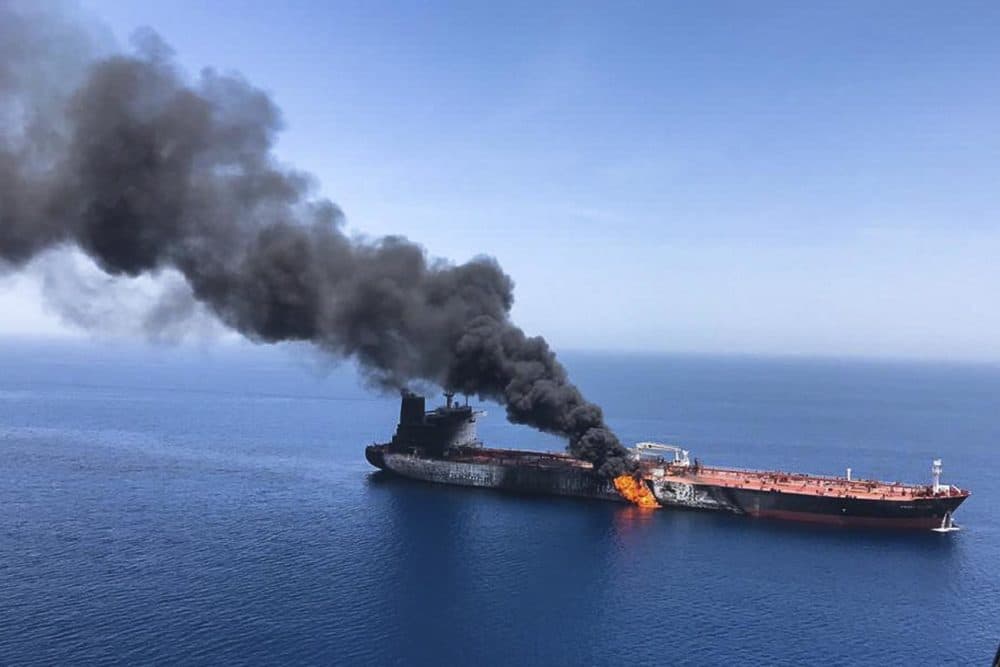Advertisement
The White House Blames Iran For Tanker Attacks. Where Are Relations Headed?

With Meghna Chakrabarti
Fears the Trump administration and Iran are on a collision course after the Mideast tanker attacks. The latest news and analysis.
Guests
David Larter, naval warfare reporter for Defense News. (@DavidLarter)
Trita Parsi, founder and former president of the National Iranian American Council. Adjunct associate professor at Georgetown University’s Center for Security Studies. Author of "Losing an Enemy: Obama, Iran and the Triumph of Diplomacy." (@tparsi)
Reuel Marc Gerecht, senior fellow with the Foundation for Defense of Democracies (@FDD). Former director of the Middle East Initiative at the Project for the New American Century, and former Middle East specialist at the CIA’s Directorate of Operations.
From The Reading List
Washington Post: "Trump rejects Iran’s denials that it attacked tankers, citing video released by Central Command" — "President Trump rejected Iran’s denials Friday that it attacked two tankers in the Gulf of Oman, insisting in a television interview that 'Iran did do it' and pointing to a video released by the U.S. Central Command purporting to show Iranian vessels retrieving an unexploded mine from one of the damaged ships.
"However, the head of the Japanese shipping company that owns one of the targeted tankers challenged the U.S. assertion that the vessel was attacked with limpet mines. He said Friday that the crew reported it was hit by 'a flying object.'
"Iran called the U.S. allegations against it 'alarming.'
"In an interview on Fox News’s 'Fox & Friends' program, Trump said, referring to the Central Command video: 'Well, Iran did do it, and you know they did it because you saw the boat.' "
CBS News: "Tanker owner seems to dispute U.S. account of Gulf of Oman attack" — "The Japanese owner of the Kokuka Courageous, one of two oil tankers targeted near the Strait of Hormuz, said Friday that sailors on board saw 'flying objects' just before it was hit, suggesting the vessel wasn't damaged by mines.
"That account contradicts what the U.S. military said as it released a video Friday it said shows Iranian forces removing an unexploded limpet mine from one of the two ships that were hit.
"The Japanese tanker was attacked twice Thursday, damaging the vessel and forcing all 21 crew members to evacuate.
"Company president Yutaka Katada said Friday he believes the flying objects seen by the sailors could have been bullets. He denied any possibility of mines or torpedoes because the damage was above the ship's waterline. He called reports of a mine attack 'false.'
"Katada said the crew members also spotted an Iranian naval ship nearby, but didn't specify whether that was before or after the attacks."
The Atlantic: "The World Is Getting Sucked Into U.S.-Iran Tensions" — "More ships burned in the Gulf of Oman today, hours after a missile hit a Saudi airport and weeks after explosions hit four other vessels in the region. As threats escalate between the United States and Iran, multiple other countries—whose tankers traverse the strategic waterways, whose oil supplies depend on safe navigation, and whose people and infrastructure are vulnerable to rockets from Yemen’s Iran-allied Houthi rebels—are getting sucked into the morass.
"Secretary of State Mike Pompeo this afternoon blamed Iran for the shipping attacks. 'No proxy group operating in the area has the resources and proficiency to act with such a high degree of sophistication,' he told reporters at a press conference. He called the explosions part of an “unacceptable campaign of escalating tension by Iran,” and said Iran is 'lashing out because the regime wants our successful maximum-pressure campaign lifted.'
"In May, it was Saudi Arabia, the United Arab Emirates, and Norway whose oil tankers were subject to what the UAE called 'sabotage' attacks. U.S. officials blamed those on Iran, though the Iranians denied responsibility and the affected countries have blamed only an unnamed 'state actor' since conducting their investigation. Today it was Japan, where a company owning one of the affected ships is based and whose prime minister has been in Tehran to soothe tensions; Panama and the Marshall Islands, under whose flags the tankers were operating; and Singapore and Taiwan, where the ships’ cargo was destined. And this time, the U.S. Navy got involved, sending a nearby destroyer to help rescue people evacuating the affected ships."
Grace Tatter produced this hour for broadcast.
This program aired on June 17, 2019.